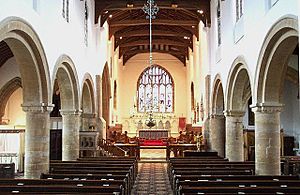Orrm facts for kids
Orrm, also known as Orrmin, was an important writer from England who lived in the 1100s. He was a type of priest called an Augustinian canon. Orrm wrote a famous book called the Ormulum. This book is a collection of religious poems or sermons.
The Ormulum is very special because it is the oldest book we have that was written entirely by its author's own hand in English. It also gives us a lot of information about the Middle English language. Orrm's work helped to share Latin teachings with both other priests and English-speaking people. Many priests at the time spoke Anglo-Norman French, but Orrm made sure his work was also for those who spoke English.
What's in a Name?
Orrm tells us his name in his book. He wrote: "Where I was christened, I was named Orrmin by name." His name, Orrmin, comes from an old language called Old Norse. It means "worm," "serpent," or "dragon." Adding "myn" to "Orrm" made it "Orrmin," which was a common name in an area of England called the Danelaw. This was a part of England where Danish laws and customs were very strong.
Sometimes Orrm used the name "Orrm" and sometimes "Orrmin." He chose the name that fit best with the rhythm of his poems.
The title of his book, Ormulum, is like the Latin word speculum, which means "mirror." Many books in the Middle Ages had "mirror" in their titles. These books were often meant to reflect or show important ideas.
Orrm's language in the Ormulum shows his Danish background. He lived in the East Midlands of England, which was part of the Danelaw. His writing includes many Old Norse words. However, there are very few French words in his language.
Where and When Orrm Lived
Orrm wrote the Ormulum because his brother, Walter, asked him to. Walter was his brother by family and also a fellow Augustinian canon. This information, along with the way Orrm wrote, helps us guess where he lived.
Many experts believe Orrm wrote his book at Bourne Abbey in Bourne, Lincolnshire. This abbey was started in 1138 by a group of priests called Arrouaisian canons. These canons followed rules similar to those of Saint Augustine.
Two things support the idea that Orrm was at Bourne Abbey. First, the abbey was founded by canons who were like Augustinians. Second, Orrm's book includes special prayers to Saint Peter and Paul the Apostle. These two saints were the main protectors of Bourne Abbey.
We don't know the exact years Orrm was active. But by looking at his handwriting, experts think he might have started writing the Ormulum around 1150. He may have continued working on it until the 1180s.



